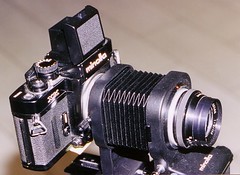Difference between revisions of "Minolta X-1"
m (→Links: cats) |
|||
| Line 8: | Line 8: | ||
* AE-S-Finder: Introduced with the [[Minolta X-1 Motor|X-1 Motor]] and equipped with a silicon cell instead of the slower CdS-cell of the AE-Finder. This was necessary for the auto exposure mode with motorized action. | * AE-S-Finder: Introduced with the [[Minolta X-1 Motor|X-1 Motor]] and equipped with a silicon cell instead of the slower CdS-cell of the AE-Finder. This was necessary for the auto exposure mode with motorized action. | ||
| + | {{Flickr_image | ||
| + | |image_source= http://www.flickr.com/photos/89864432@N00/274107858/in/pool-camerapedia/ | ||
| + | |image= http://static.flickr.com/103/274107858_21b0a18191_m.jpg | ||
| + | |image_align= left | ||
| + | |image_text= XK with bellows for macro photography | ||
| + | }} | ||
And the photographer had the choice among nine (later eleven) interchangeable focussing screens. It further had a socket for a synchronized flash shoe, mirror lock up feature, stop down lever, multi exposure capabillity. | And the photographer had the choice among nine (later eleven) interchangeable focussing screens. It further had a socket for a synchronized flash shoe, mirror lock up feature, stop down lever, multi exposure capabillity. | ||
Revision as of 20:54, 19 October 2006
The Minolta X-1 (XK in north America, XM in Europe and elsewhere) was the professional model in the Minolta line-up. It took about ten years to develop and started a new era in the Minolta SR system. It was the first Minolta SLR with interchangeable lenses to have an electronically controlled shutter, a horizontically traveling shutter with titanium foil curtains and capable of a shortest speed of 1/2000s (longest selectable was 16 s). It had interchangeable finders:
- AE-Finder: The standard finder with a refined CLC metering system (introduced by the SR-T 101) and aperture priority auto exposure mode.
- M-Finder: A simpler and cheaper version of the AE-finder, the match-needle finder. It did not show metered shutter times but had only a needle to align. And it lacked the automatic mode.
- P-finder: The plain finder, an unmetered pentaprism finder, which gave the X-1 a much more compact silhouette than the bulky finders above.
- High-Magnification-Finder: Unmetered finder with 6.2 magnification ratio and diopter adjustment.
- Waist-Level-Finder: Unmetered with magnifier.
- AE-S-Finder: Introduced with the X-1 Motor and equipped with a silicon cell instead of the slower CdS-cell of the AE-Finder. This was necessary for the auto exposure mode with motorized action.

|
| XK with bellows for macro photography |
And the photographer had the choice among nine (later eleven) interchangeable focussing screens. It further had a socket for a synchronized flash shoe, mirror lock up feature, stop down lever, multi exposure capabillity.
The X-1 was the first of the X-series and so a completely new designed lens line was introduced and labelled with 'MC Rokkor-X' in the north American market (the rest of the world kept the plain 'MC Rokkor' designation). The most striking attribute was the new waffled rubber coating of the focus grip. The X-1 and its export descendents were available in black finish only.